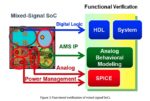It’s no secret that innovation in AI chip architectures is on a tear. When you put together the spatial complexity of highly parallelized algorithms with the need to localize memory accesses on-chip to the greatest extent possible, we’re seeing a proliferation of all kinds of domain-specific architectures. Which in the normal… Read More
WEBINAR: Addressing Verification Challenges in the Development of Optimized SRAM Solutions with surecore and Mentor Solido
After spending a significant amount of my career in the IP library business it was an easy transition to Solido Design. I spent 10+ years traveling the world with CEO Amit Gupta working with the foundries and their top customers. In fact, the top 40 semiconductor companies use Solido. IP companies are also big Solido users including… Read More
Creating Analog PLL IP for TSMC 5nm and 3nm
TSMC’s Open Innovation Platform’s main objective is to create and promote partnership for producing chips. This year’s OIP event included a presentation on the joint efforts of Silicon Creations, Mentor, a Siemens business and TSMC to produce essential PLL IP for 5nm and 3nm designs. The relentless push for smaller geometries… Read More
Getting Physical to Improve Test – White Paper
One of the most significant and oft repeated trends in EDA is the use of information from layout to help drive other parts of the design flow. This has happened with simulation and synthesis among other things. Of course, we think of test as a physical operation, but test pattern generation and sorting have been netlist based operations.… Read More
White Paper – Mixed Signal Verification for Nanometer SOCs
The number of touchpoints between analog and digital circuits in high performance SoCs is increasing. This is not a problem because it is possible to implement critical analog blocks directly on nanometer scale digital ICs. However, in many cases digital interfaces or digital feedback circuitry configures these analog blocks… Read More
The Big Three Weigh in on Emulation Best Practices
As software content increases in system-on-chip and system-in-package designs, emulation has become a critical enabling technology for the software team. This technology offers software developers the opportunity to verify their code in against a high-fidelity model of the target system that actually executes fast enough… Read More
RISC-V SDKs, from IP Vendor or a Third Party?
Like many of us, I’m a fan of open-source solutions. They provide common platforms for common product evolution, avoiding a lot of unnecessary wheel re-invention, over and over again. Linux, TensorFlow, Apache projects, etc., etc. More recently the theme moved into hardware with OpenCores and now the RISC-V ISA. All good stuff.… Read More
Low Power and RISC-V Talks at DAC2020, Hosted by Mentor
I’m going to get to low power and RISC-V, but first I’m trying out virtual DAC this year. Seems to be working smoothly, aside from some glitches in registration. But maybe that’s just me – I switched email addresses in the middle of the process. Some sessions are live, many pre-recorded, not quite the same interactive experience… Read More
How About a Faster Fast SPICE? Much Faster!
When Analog FastSPICE was first introduced in 2006 it changed the landscape for high performance SPICE simulation. During the last 14 years it has been used widely to verify advanced nanometer designs. Of course, since then the most advanced designs have progressed significantly, making verification even more difficult. Just… Read More
Mentor Cuts Circuit Verification Time with Unique Recon Technology
Most of us will remember the productivity boost that hierarchical analysis provided vs. analyzing a chip flat. This “divide and conquer” approach has worked well for all kinds of designs for many years. But, as technology advances tend to do, the bar is moving again. The new challenges are rooted in the iterative nature of high complexity… Read More











